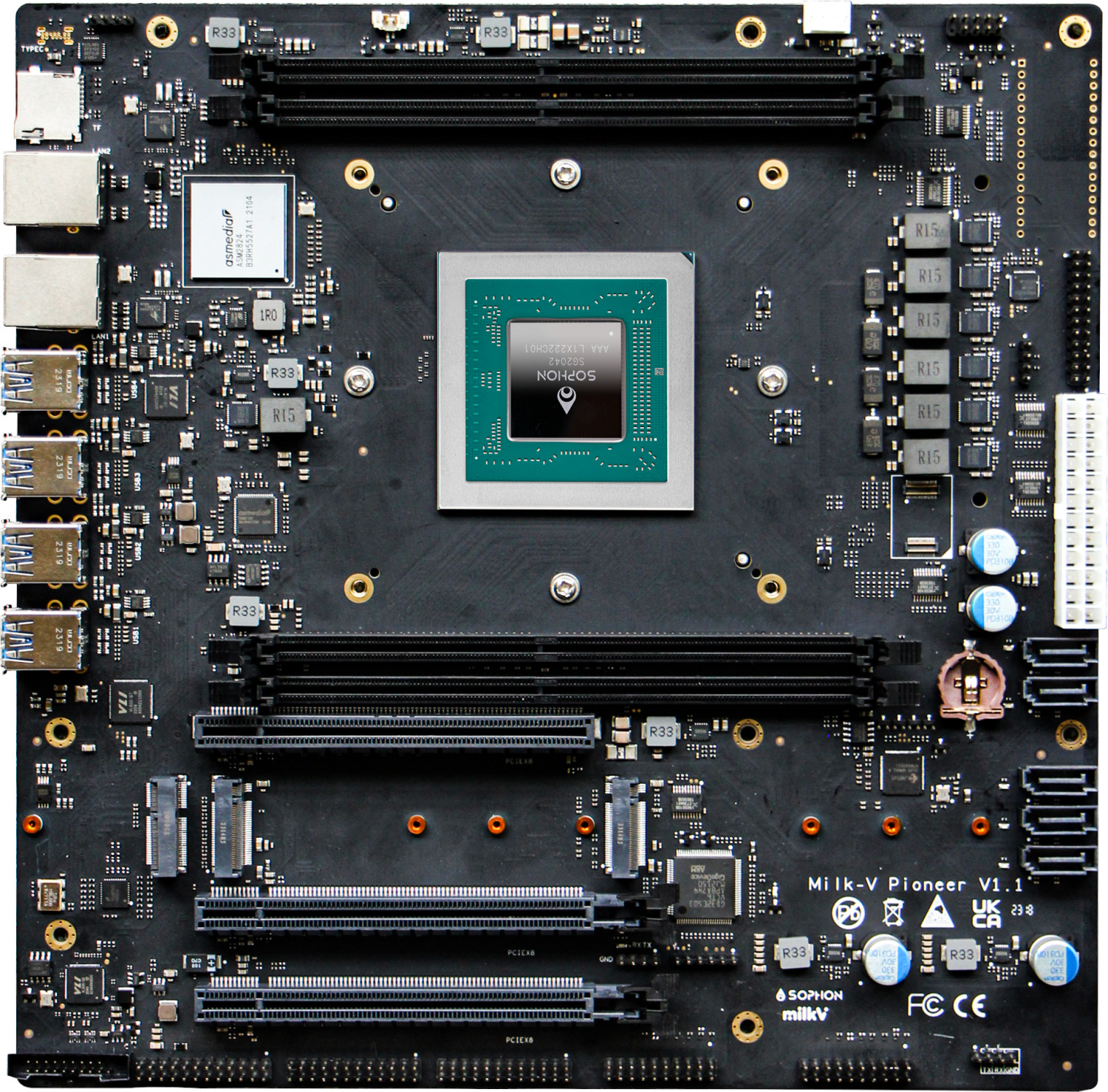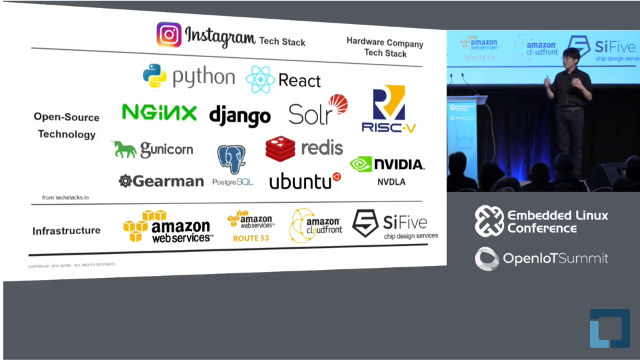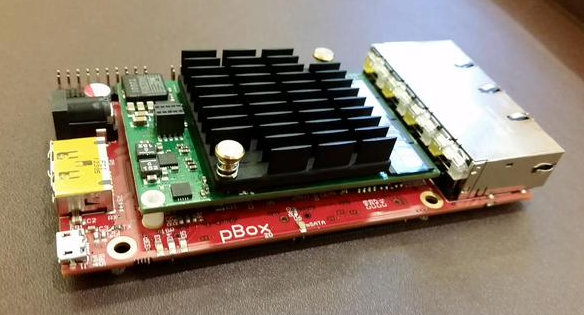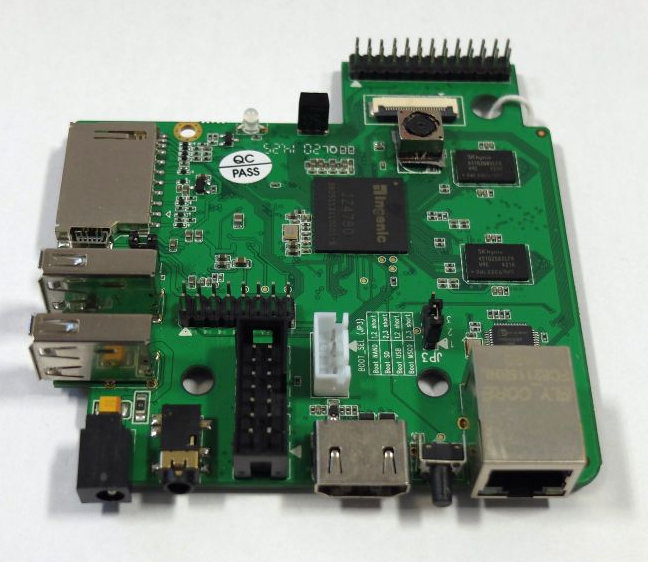There’s now a microATX motherboard and workstation for native RISC-V development based on the SOPHON SG2042 64-core RISC-V C920 processor with up to 128GB DDR4 memory, various SATA and M.2 NVMe interfaces for storage, three PCIe x16 slot for expansion and more. I remember a few years ago, there was a lot of talk about making a workstation for native Arm development instead of relying on x86 machines, cross-compilation, and emulation. So we got hardware like the HoneyComb LX2K, Ampere eMAG, and more recently the ADLINK Ampere Altra Dev Kit to achieve this goal. The RISC-V ecosystem is now getting something similar thanks to the Milk-V Pioneer microATX motherboard and the Pioneer Box that provides a complete 64-core RISC-V workstation with DIMM memory, SATA and NVMe storage, a graphics card, 10GbE networking, a 350W power supply, and more. Pioneer board specifications: SoC – Sophgo SOPHON SG2042 64-core RISC-V processor (T-Head […]
RISC-V Keynote at Embedded Linux Conference 2018 (Video)
The Embedded Linux Conference and OpenIoT Summit 2018 have just started, and the Linux Foundation has already uploaded a few keynote videos to YouTube, including the one by Yunsup Lee, Co-Founder and CTO, SiFive, entitled “Designing the Next Billion Chips: How RISC-V is Revolutionizing Hardware”. Yunsup explains the current problem with chip development, and go through the open source RISC-V solutions offered by Sifive. Currently design a chip has a high upfront (NRE = non-recurring engineering) costs, is time-consuming (1.5 to 2 years at least) and silicon vendors normally target high volume production, but now many applications like IoT or machine learning require custom chips that may not be (yet) manufactured in such high volume. The solution is to adapt some idea from open source software to open source hardware in order to lower the costs, enable fast prototyping, and involve the community of designers and software developers. He took […]
Google OnHub 802.11ac WiFi Router Also Supports Bluetooth 4.0, Zigbee/Thread, and Automatic Firmware Upgrades
Google has just announced OnHub, a $200 router designed in cooperation with TP-Link which the company claims will be “fast, secure, and easy to use”. It should indeed be fast as it’s a Class AC1900 router capable of 600 Mbps with 802.11n and 1300 Mbps with 802.11ac. Router are gateways between home networks and the Internet, but most of them aren’t updated automatically, leaving them vulnerable to attacks, while OnHub should get its firmware regularly updated over-the-air and include a Trusted Platform Module (TPM), making it more secure. Finally, Android and iOS apps are available to easily manage the router. OnHub (TGR1900) router specifications: WiSoC – Qualcomm Atheros IPQ8064 dual core Krait processor @ 1.4 GHz System Memory – 1GB DDR3L Storage – 4GB eMMC, 8MB NOR flash Connectivity 802.11 b/g/n 3×3 with smart antenna 802.11 a/n/ac 3×3 with smart antenna AUX wireless (802.11 a/b/g/n/ac 1×1) – I don’t understand […]
Online Labs pBox (C1 Node) is a mini ARM Server with 4 Gigabit Ethernet Ports, mSATA and mPCIe Slots
Online Labs, a subsidiary of Iliad (free), recently launched hosting services with dedicated ARM servers based on Marvell processor with modules they call C1. The company has decided to design a baseboard (pBox) for C1 module, and, as I understand it, plans to sell it to the public. It’s an exciting development for those who are looking for affordable and tiny purpose built Linux ARM servers. Preliminary C1 Node / pBox mini server specifications (based on C1 specs and bits of information gathered online): SoC – Marvell Armada 370/XP quad core ARMv7 processor @ up to 1.2 GHz System Memory – 2GB RAM Storage – 256 MB NAND flash + mSATA slot + eSATA port + micro SD slot Connectivity – 4x Gigabit Ethernet ports USB – 1x micro USB port Expansion – mini PCie, 1x 20-pin header for expansion (no details yet) Debugging – 20-pin JTAG connector Power Supply […]
MIPS Creator CI20 Development Board Powered by Ingenic JZ4780 SoC
There are plenty of ARM based development boards running Linux and Android, but with MIPS it’s a different story. Microchip does have some affordable development board powered by their MIPS MCUs, but these don’t have the hardware specs to run Linux based operating systems, and Ingenic Newton Platform for wearables can run Android and Linux, but it appears to be reversed to companies with virtual no documentation. There are some MIPS platform running OpenWRT on hardware such as routers or Wi-Fi boards, but these can’t be considered fully supported development boards. But Imagination Technologies is trying to make MIPS more relevant, first by launching Prpl developers’ community, and MIPS Creator CI20 development board powered by Ingenic JZ4780 dual core MIPS32 (Xburst) core processor with PowerVR SGX540 GPU should soon be available with complete documentation and source code. Let’s go through the hardware specifications first: SoC – Ingenic JZ4780 dual core […]






